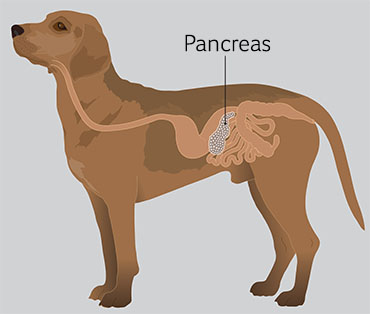Pancreatitis in dogs
Overview
- The pancreas is an organ that sits close to the stomach and helps digest food.
- Pancreatitis is inflammation of the pancreas, which causes pain and vomiting.
- Pancreatitis ranges from mild to very severe.
- Treatment for pancreatitis involves nursing, pain relief, anti-sickness medication and sometimes a drip.
- Pancreatitis can affect any breed of dog but is very common in Miniature Schnauzers.
Symptoms
Pancreatitis is inflammation of the pancreas (an organ that sits next to the stomach). Pancreatitis causes vomiting, nausea and pain. The symptoms of pancreatitis vary depending how severely your dog is affected.
Symptoms of pancreatitis often start suddenly and commonly include:
- Vomiting
- Eating less (or not eating at all)
- Painful tummy - you may notice your dog stretching into a prayer position because their abdomen is painful (see picture)
- Diarrhoea
- Weight loss.
Pancreatitis can range from being mild to severe. Not all dogs will have every symptom listed, some will only have one or two.

The pancreas sits at the front of the abdomen next to the stomach. Click image to enlarge.
When to contact your vet
Book an appointment with your vet ASAP if your dog has any of the symptoms above or you think they may have pancreatitis, especially if they’ve had it previously. Pancreatitis can cause severe illness and even death if left untreated.
You know your dog best. If they don’t have the symptoms listed above but you are still concerned it’s always best to contact your vet.

Dog in prayer position due to abdominal pain.
Causes
Your dog is at a higher risk of developing pancreatitis if:
- They’re overweight
- They’re unwell
- They’ve recently had surgery
- They’ve recently eaten some high fat foods (e.g. pork, cheese, butter).
Treatment
After a full examination, your vet might want to run some tests to check for pancreatitis. Tests may include blood tests, X-rays and an ultrasound scan.
Treatment depends on how severe the pancreatitis is.
Mild pancreatitis
- Anti-sickness medicine
- Strong pain relief
- Rest
- Tempting them to eat small, low fat meals given throughout the day.
Severe pancreatitis
- Staying a few days in a veterinary hospital
- A drip to give lifesaving fluids
- Nursing care
- Careful feeding (if they aren’t eating on their own, it’s sometimes necessary to place a stomach tube).
Outlook
Most dogs with pancreatitis make a full recovery after treatment from a vet but unfortunately, some dogs suffer with pancreatitis several times throughout their life. If your dog is suffering from recurrent pancreatitis see the below information about ongoing care.
Very rarely pancreatitis can lead on to cause diabetes.
Ongoing care
If your dog has had pancreatitis in the past, they may be at risk of developing it again in the future. Actions you can take to lower the risk of pancreatitis include:
Feed a low fat food
Ideally a prescription diet from your vet - low fat dog foods sold in shops may still contain too much fat.
Low fat treats
Only give your dog low fat treats. Pieces of chicken breast or small bits of carrot are perfect. Avoid high fat treats like cheese or pork.
Keep your dog slim and fit
Staying slim and fit is vitally important for good health.
Consider insuring your dog as soon as you get them, before any signs of illness start. This will ensure you have all the support you need to care for them.
Published: June 2018
Did you find this page useful?
Tell us more
Please note, our vets and nurses are unable to respond to questions via this form. If you are concerned about your pet’s health, please contact your vet directly.
Thank you for your feedback
Want to hear more about PDSA and get pet care tips from our vet experts?
Sign up to our e-newsletter
Written by vets and vet nurses. This advice is for UK pets only. Illustrations by Samantha Elmhurst.

